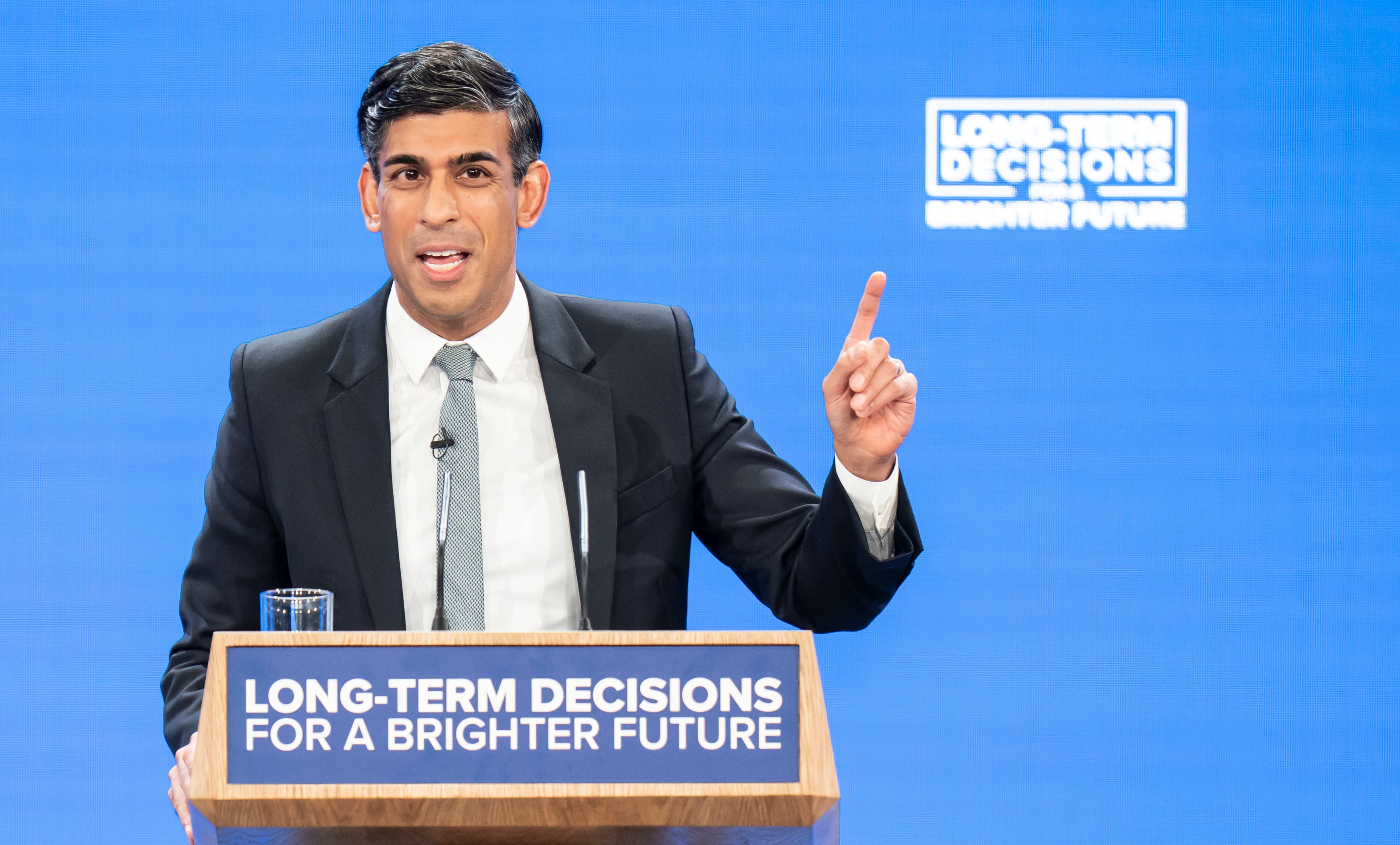Wedge issues and elephant traps – Tory tactics Sunak hopes will bamboozle Labour
From the ‘war on motorists’ to the trans debate, the Tories used this conference to drive a policy wedge between themselves and Starmer’s Labour Party. It’s an old trick, says Sean O’Grady, but not likely to work if the electorate have already decided to sack Sunak at the next election


Wedge issues. Clear blue water. Dividing lines. If the Conservative Party conference was about anything, it was defining differences with Labour, forcing the opposition to define itself in contradistinction.
Speech after speech laid down challenges that were consciously designed to put Sir Keir Starmer on the spot and disrupt Labour’s own conference. There are plenty of questions to be answered about where the parties stand.
Is this a new phenomenon?
It’s an old technique. Every Tory chancellor who cut a tax has challenged their shadow to say if they’ll put it back up again. As a deliberate ploy it was used most extensively, and successfully, by George Osborne who was the Tories’ chief strategist as well as chancellor.
The downside for a party indulging in this type of political warfare is that it can seem divisive and open up divisions in its own ranks (illustrated when one dissident Tory, Andrew Boff, heckled Suella Braverman’s “transphobic rant” before being ejected from the conference hall).
What’s the most potent question now faced by Labour?
Tough choice. The one that currently makes politicians squirm most is “what is a woman?” (or variations on the primary reproductive organs). Sunak pushed it along in his speech by declaring that “a man is a man and a woman is a woman, it is just common sense”. This stance has been bolstered by policy announcements probably concocted purely for “wedge” purposes; thus, the shadow health secretary will be asked about Steve Barclay’s pledge to ban trans women from women’s wards, and the entire shadow cabinet will be asked: “Tories know what a woman is – do you?”
What about HS2?
Cancelling the second phase of HS2 to Manchester ought to be an unalloyed humiliation for the Tories. However, in (apparently) transferring billions to smaller projects across the North of England, the Tories have set up Labour for a fall. If Labour promises to restore the fast link to Manchester, it will have to forgo Sunak’s alternative improvements, such as a new station for Bradford or a bypass for Shipley.
It seems as if Labour is edging towards backing the cancellation, but has yet to commit either way. Thus, despite some vicious attacks on the decision to cancel the HS2 link from Birmingham to Manchester, all that Labour’s campaign chief Pat McFadden can say is that the party will “look at the numbers and see what we inherit” when the election comes. That is rather more timid in tone than Manchester mayor Andy Burnham, but even he isn’t promising his party will bring HS2 to the North. It feels as if Sunak might have got away with it – though voters in the many traditional marginal and red wall seats in Lancashire, Yorkshire and elsewhere will no doubt punish the Tories for betraying the wider promise to “level up”.
Can Labour dodge questions about the so-called war on motorists?
That’s another tricky one. The aftermath of the Uxbridge by-election, where the London Ulez expansion helped save a Tory seat, provoked a rift between London mayor Sadiq Khan, who is in charge of transport in the capital, and Starmer, who must worry about the effect on other areas including marginal constituencies. There’s already a potential tension between Labour at the national level and with Wales, where a 20mph limit is being mandated in some urban areas. Of course lower speed limits, Low Traffic Neighbourhoods and permanent bus lanes are popular with some drivers – who can also be parents, cyclists and bus passengers – but Labour will be pushed to decide whose side it is on. Similar considerations apply to the weakening of the net zero targets on sales of new petrol cars and phasing out gas- and oil-fuelled boilers. So far, Labour has stuck to its green principles.
Are there any easy options?
Funnily enough, most of the “new” ideas in Sunak’s speech were non-ideological and relatively uncontroversial. There’s a sensible debate to be had about whether it is better to study five subjects instead of three, and the phased banning of sales of tobacco products is precisely the kind of policy Labour would naturally adopt.
What will happen next?
Labour is shrewd enough to spot these elephant traps, and is proving more adept at avoiding them. An opposition’s instinct is to denounce opponents and promise to reverse whatever they’re doing once in power; that’s less true now than in, say, Jeremy Corbyn’s time. Elephant traps only work if your opponent is stupid enough to step into them. These wedge issues are also more effective if voters are listening to you, but the signs are that many voters have made their minds up about the Conservatives.






Join our commenting forum
Join thought-provoking conversations, follow other Independent readers and see their replies
Comments